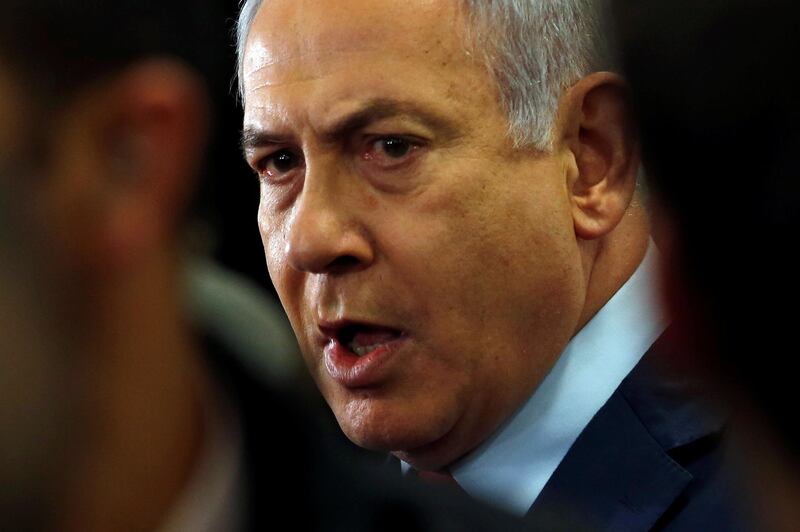Israeli Prime Minister Benjamin Netanyahu on Thursday said he would not resign despite being charged with bribery, fraud and breach of trust in a corruption scandal he called an "attempted coup".
The charges announced by Attorney General Avichai Mandelblit were the first of their kind against a serving Israeli prime minister and represented the gravest crisis in the political career of Israel's longest-serving leader.
Mr Netanyahu, in power since 2009 and before that in the 1990s, has decisively turned the country to the right. He has denied wrongdoing in the three corruption cases, saying he is the victim of a political witch hunt.
Mr Netanyahu is under no legal obligation to resign but the indictment could further embolden challengers after two inconclusive elections since April, with a third expected to be announced in weeks.
Conviction on the charges could bring a long jail term but any trial could be delayed for months by the political crisis, and Mr Netanyahu could try to secure parliamentary immunity from prosecution.
In rejecting the charges, he used the language of his ally, US President Donald Trump.
"It is an attempted coup based on fabrications and a tainted and biased investigative process," Mr Netanyahu said in a televised speech.

"I will continue to lead the country, according to the letter of the law, with responsibility, devotion and concern for all of our futures."
His centre-left challenger in the two elections this year, Benny Gantz, tweeted: "There is no coup in Israel, just a bid by him to hang on to power."
Mr Mandelblit, who was appointed by Mr Netanyahu, spelt out the indictment in his own televised statement.
"This is a difficult and sad day," he said.
But Mr Mandelblit said it was his duty to ensure that no one in Israel was above the law.
Police recommended in February that he file criminal charges against the right-wing prime minister in the long-running investigations.
Mr Netanyahu is suspected of wrongfully accepting $264,000 (Dh969,619) worth of gifts, which prosecutors said included cigars and champagne, from wealthy acquaintances.
He is also charged with dispensing favours in attempts for better coverage by Israel's biggest selling newspaper, Yedioth Ahronoth, and the Walla website.
The scandals have also engulfed Mr Netanyahu’s family and his inner circle, with at least three former close confidants testifying against him.
Mr Netanyahu and his wife, Sara, have long been known for their fondness for expensive lifestyles and questionable use of public funds.
Mrs Netanyahu was convicted of misusing state funds after she reached a plea bargain on claims that she overspent about $100,000 of state money on lavish meals. She had previously been indicted for graft, fraud and breach of trust.

Mr Netanyahu could face up to 10 years in prison if convicted of bribery, and a maximum three-year term for fraud and breach of trust. He could also seek a plea deal rather than stand trial.
His allies in the Knesset have said they would try to grant him parliamentary immunity from prosecution. But with Israeli politics in unprecedented turmoil, it is unclear whether such a move is possible.
Loyalists in Mr Netanyahu's right-wing Likud party have accused the Israeli justice system of bias, and he has said that receiving gifts from friends is not against the law.
His legal team says criminal investigations into the relations between politicians and the news media would be a threat to a free press, a central pillar of any democracy.
Mr Netanyahu and Mr Gantz have failed to form a government after two elections, in April and September, leaving the country in political and economic stasis.
If there is no political breakthrough in the next three weeks, Israel will face yet another election, which few want.







